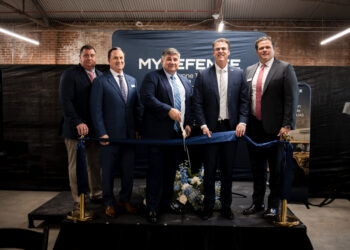OKLAHOMA CITY (OBV) – A workforce revitalization bill that creates an Oklahoma Workforce Commission passed the House of Representatives, but it now must be considered by a legislative Conference Committee.
Senate Bill 621 passed the House with a 79-13 vote. The bill’s title was stricken after a series of questions on the House floor, which necessitates that the bill now move to a Conference Committee for consideration. The bill can be amended in the Conference Committee. It will go back to the Senate and House floors for a new vote after committee members sign off on it.
Written by Sen. Adam Pugh, R-Edmond, and Rep. Brian Hill, R-Mustang, the bill establishes the Oklahoma Workforce Commission.
“The purpose of this bill and all the work that has gone into this bill for months and months is to ensure that we have an entity that gets up in the morning and actually makes sure that we’re listening to industry and actually producing the workforce of tomorrow, and then coordinating with those agency providers out there that actually do the work,” Hill said on the House floor Wednesday. “That’s the purpose of this legislation and I hope to see it actually get somewhere.”
The Workforce Commission will be focused on coordinating and developing the state’s workforce, building a workforce plan and using public and private funds to complete its goals.
“The role [of the Workforce Commission] is not to create, the role is to identify the need, connect it with the providers and identify the funding sources to us so we can more strategically spend dollars for the betterment of our Oklahoma kids and our communities and jobs,” Hill said.
The commission, as envisioned in SB 621, will be composed of nine members, each a representative from Oklahoma’s private business sector. The governor will appoint three members, the House speaker will appoint three members and the Senate pro tem will appoint three members.
It’s essential that the commission be composed of members of the private sector who have business backgrounds, according to Oklahoma business leaders.
“It’s critical that this be run by the private sector so government doesn’t create jobs; the private sector creates jobs,” said Rick Nagel, a managing partner of Acorn Growth Companies, an Oklahoma City-based equity firm focused on aerospace, defense, intelligence and space investments. “So, in order for this to really work and be effective, you’re going to need private sector leaders engaged at the top that will form and be the volunteers on this commission to set the policy. Because no one’s going to be able to describe what’s needed other than the folks that are actually doing the hiring in our State Senate.”
Tim Pehrson, president and CEO of Integris Health, concurred that leading members of the state’s business community should comprise the Workforce Commission.
“The business leaders know the needs of the workforce of the future, and they’re the ones in a perfect position to be able to provide guidance and advice to what the workforce needs are for our community in our state,” Pehrson said. “And then we can have the providers come and actually provide those services based on the needs of the businesses.”
Hill took questions from fellow House members and said that Oklahoma CareerTech will be involved with the Task Force since they will be working to provide the workforce and help with strategic solutions for growing the workforce.
“As someone who has toured half the campuses across the state, I’m very passionate about them,” Hill said. “I think their voice is in the part where the commission looks and hears from industry and what is actually needed by industry and then connects it to CareerTech higher ed and those providers.”
Oklahoma has a 3 percent unemployment rate; unemployment routinely stays below 4 percent, but thousands of jobs across Oklahoma remain open each month. Oklahoma’s labor participation rate – the percentage of working-age Oklahomans actively participating in the workforce – was at 60.5 percent in December 2022, which ranked 35th in the nation.
Pugh filed SB 621 in January soon after Gov. Kevin Stitt issued Executive Order 2023-02 to streamline and refocus the state’s workforce management process. The executive order calls for the creation of a Workforce Transformation Task Force. The task force is composed of private sector leaders and public officials tasked with identifying ways funding can be aligned to goals and economic needs, as well as implementing a comprehensive strategy that will change workforce for the better.
The Workforce Commission will direct the state’s workforce development strategy and administer and oversee funding allocated by the legislature for workforce development initiatives. The commission can contract with outside parties to achieve its goals.
“How can we ensure across the entire enterprise of systems and agencies, and individuals and entities that build our workforce, how can we ensure we are creating men and women with the skillsets that they need – whether it be aerospace, engineering, biomanufacturing, agribusiness, healthcare, whatever jobs may exist for my five year old in 2040 that don’t even exist today – and who will be in charge of that?” Pugh said in February. “Senate Bill 621 seeks to provide that answer. And it will work with business leaders in the private sector, with education leaders and with government leaders to ensure that [state government leaders] are not the ones growing the economy, that we’re giving you all the tools you need to grow the economy.”

















